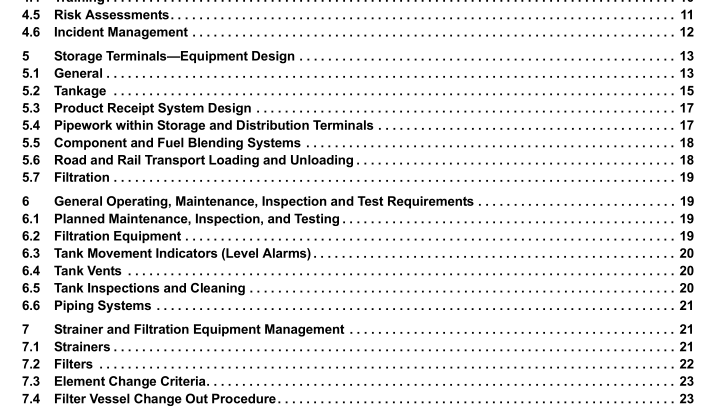API RP 1640:2013 pdf free download.Product Quality in Light Product Storage and Handling Operations
5.1.2.1 Ethanol Compatibility
As stated in API 1626, before handling, storing and dispensing gasoline-ethanol blends, consideration should be given to the design and compatibilities of all components coming in contact with the blended liquid and vapors. Blend properties that should be considered include, stress corrosion cracking of steel structures, the flammability of vapors, vapor pressure, the hydrophilic nature of ethanol, the differential solvency of ethanol (i.e. the impact on polymeric materials: swelling, extraction, permeation, and embrittlement) and the water tolerance of ethanol blends. When a new blend is introduced, evaluate these properties for every step in the supply chain to assure product quality and safe handling and storage.
Compared to gasoline and hydrocarbon fuels in general, ethanol has a high electrical conductivity and oxygen content. The chemical properties of ethanol also contribute to its ability to readily absorb water. The suspension of water within gasoline-ethanol blends enhances galvanic corrosion and rusting by providing an oxygen-rich environment that is also a good conductor of electricity. These conditions present in ethanol blend service can lead to corrosion and ultimately metal loss of various components which are not normally adversely affected by gasoline.
Ethanol is not compatible with some grades of soft metals (i.e. zinc, brass, copper, lead, and aluminum). These metals may degrade or corrode in contact with ethanol and possibly cause a component failure or affect fuel quality. Seals, gaskets and other elastomers that are not specifically intended for use with ethanol blends can lose their integrity leading to a product leak. Before using any component in ethanol service,verify its compatibility with themanufacturer.
5.1.2.2Biodiesel Compatibility6
Existing supply and distribution facilities designed for use with hydrocarbon-only diesel fuels should in general beadequate for handling diesel fuels containing biodiesel. lt is recommended to review the need for hardwaremodfications throughout the supply chain with consideration of potential material incompatibilities and the increasedrisk of deposit formation.The following points should be specifically considered:
– dedicated lines may be needed for imports and exports (at terminals) in order to avoid water and other
contamination;
gaskets should be compatible with B100 including those fitted in flanges and swivel joints;
lagged or heat traced pipelines may be appropriate depending on the ambient temperatures and the cold flowproperties of the diesel blend; and
-the design of product filters should be considered as well as the frequency of change out.
lt is important to recognize that biodiesel is chemically different from fuel hydrocarbons due to its chemicalfunctionality. Because of this chemical difference,various components in the fuel distribution system may be lesscompatible with biodiesel (B100) than they are with hydrocarbon-only fuels. Sensitive materials may swell or losetheir integrity after prolonged contact with biodiesel. They may even promote fuel degradation reactions due to theirchemical composition.
Biodiesel may degrade some hoses,gaskets,seals,elastomers, glues and plastics after prolonged exposure.Biodiesel may also permeate some types of plastics (polyethylene,polypropylene) over time and they are notrecommended for use in storing B100.Natural or nitrile rubber compounds, polypropyiene, polyvinyl, and plasticizedPVC tubing materials are particularly sensitive.Polytetrafluoroethylene,fluoroelastomers or synthetic rubbermaterials,and Nylon are not sensitive to biodiesel and are among the materials that can be used to updateincompatible materials in equipment.
Most tanks that are designed to store diesel fuel should also be adequate for storing B100.Acceptable storage tankmaterials include aluminum, steel, fluorinated polyethylene, fluorinated polypropylene, polytetrafiuoroethylene, andmost fiberglass products.
Brass, bronze,copper,lead, tin and zinc may catalyze the oxidation of biodiesel accelerating the formation ofinsoluble gels and salts. Lead solders and zinc linings should be avoided, as should copper pipes, brass regulators,and copper fittings. Affected equipment should be replaced with stainless steel, carbon steel or aluminum.
Table 3 provides an overview of materials that are either recommended for use or should be avoided when handingbiodiesel (B100). This list is not comprehensive and the quality of the material must be appropriate for the intendedapplication.Suppliers of B100 products and equipment vendors should be consulted regarding the most recentfindings on material compatibility for bio-component applications.API RP 1640 pdf download.API RP 1640:2013 pdf free download
